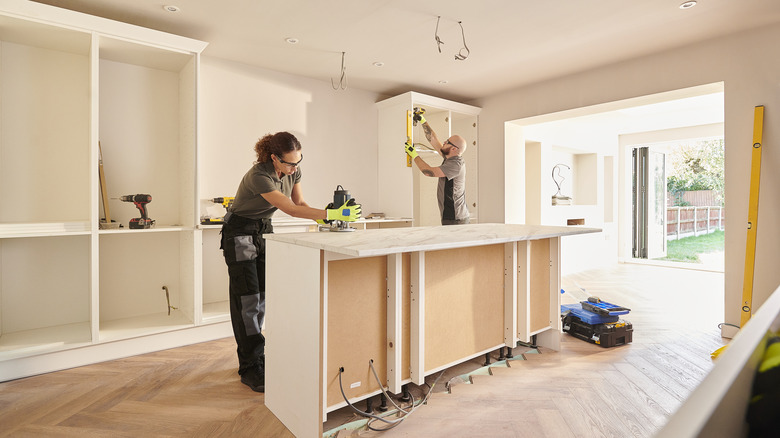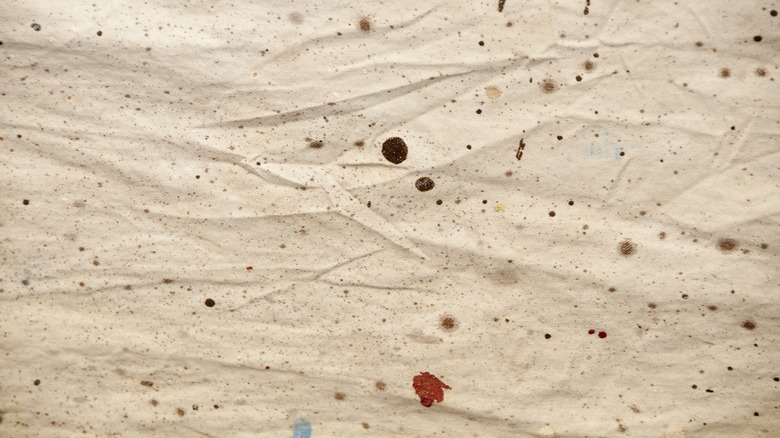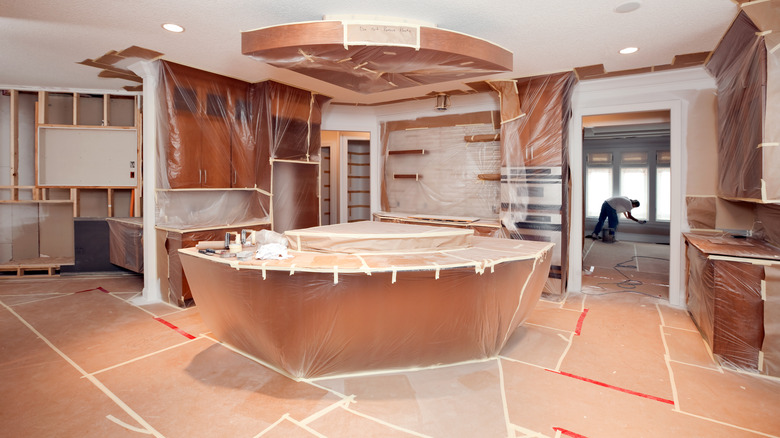The Easiest Way To Protect Your Countertops During A Kitchen Renovation
Renovating your kitchen is an exciting experience. Whether you enlist the help of a professional contractor or two or embark on the journey solo, investing money in the improvement of such a vital space in your home is one of the most proactive ways to satisfy the residents' ever-changing wants and needs and witness a financial return in the form of a bump in your home's overall value. But such projects can spell trouble for your kitchen's countertops unless you take the initiative from the very beginning to protect them. Place a leak-resistant drop cloth on top of your countertops before starting any sort of construction project in your kitchen to prevent them from suffering insignificant or extreme defacement by means of inevitable messes and sheer accidents.
Much can go wrong throughout a kitchen renovation, from electric tool malfunctions to paint splatters. Countertops, especially those made from softer and more malleable materials, can easily fall victim to accidents in the construction zone, accidents that can cost hundreds of dollars extra to repair once the kitchen overhaul is complete. No matter the size of your kitchen project, keeping your countertops safe from unnecessary damage should be a priority when going about renovations, especially if your countertops are made of natural stone or other expensive materials. Here's more on the easiest way to protect your countertops while renovating your kitchen, along with a couple of creative alternatives that should prove to be just as effective.
Cover your countertops with a drop cloth
Just as you'd cover doorknobs, hinges, and power outlet plates when painting walls in your home, covering your kitchen countertops with a protective drop cloth can save you a lot of time and effort when preparing your kitchen to be used once renovations are complete. Drop cloths are thick pieces of fabric, often made of canvas, designed to protect floors, counters, and other flat surfaces around the house from paint, dust, and other miscellaneous debris while working. Available online and at most hardware stores, drop cloths are typically washable, reusable, and capable of assisting with both indoor and outdoor projects, making them a great investment for frequent DIYers.
Drop cloths are capable of protecting more than just your kitchen's counters. You can also use them as defensive barriers for cabinetry and, of course, your floors if you have enough material on hand to cover them. Simply drape the cloths over your kitchen island or countertop before starting a renovation to make your after-project clean-up session a breeze. Many versions of drop cloths are slip-resistant, meaning they're produced with a special "clingy" layer on the very bottom that allows the drop cloth to grip the hard, flat surface underneath it. This design prevents the cloth from repeatedly sliding out of place over the course of the renovation and prevents the user from needing to secure the cloth further with tape.
Alternatives to using drop cloths
If you don't want to work with drop cloths in your kitchen or simply don't have access to one, there are other options you can try instead that should produce similar results. A plastic sheet, similar to a tarp used for gardening or camping, is one of these alternatives. However, unlike many varieties of drop cloths, plastic struggles to stay in place on its own. You may need to tape the sheet's ends down at the edges of your countertop to keep it from shifting as you or the contractors work, a task some may see as an added inconvenience. Also, with the plastic sheet being thinner than a multi-layered canvas drop cloth, this option may not offer as much protection from heavy hits caused by machinery.
On the topic of plastic, countertop protection film, a roll of transparent plastic designed to keep natural stone countertops safe from scratches and loose debris, is also available for purchase online and inside select big box retailers. Similar to the plastic wrap used when cooking, the thin, flexible material will stick to a countertop's surface all on its own once rolled out and cut to size, fitting snugly around its sides and corners so long as it's evenly applied. You can also use cardboard to protect your countertops during renovations. Thicker than both plastic tarp and protective film, cardboard sheets can offer a bit more cushion to safeguard your countertops from physical harm.


